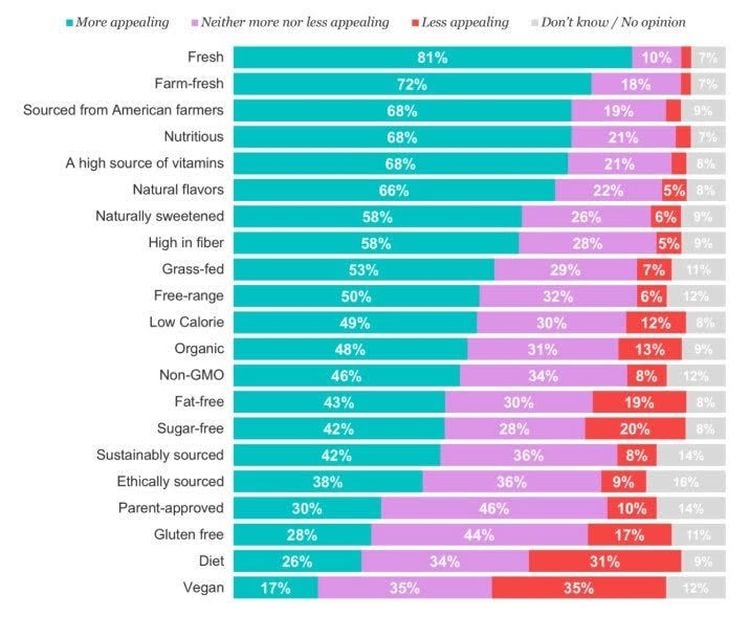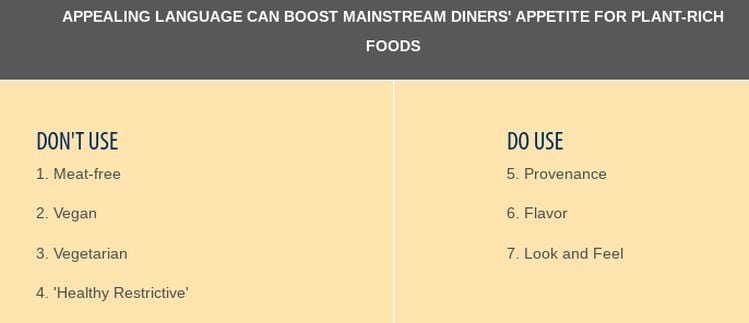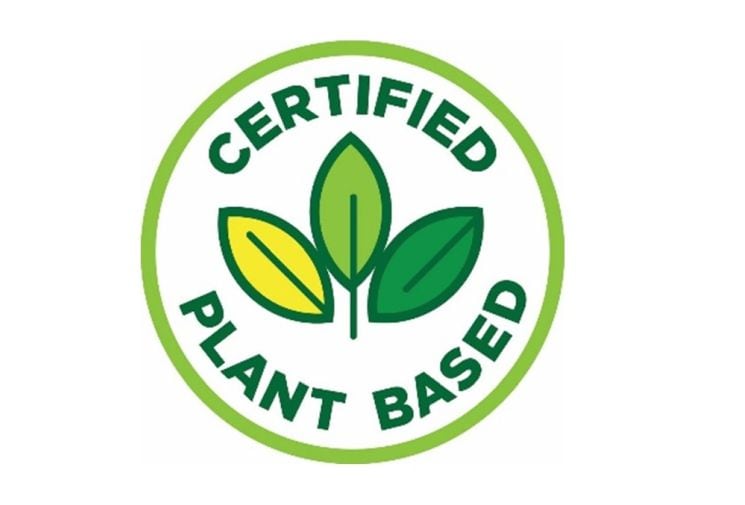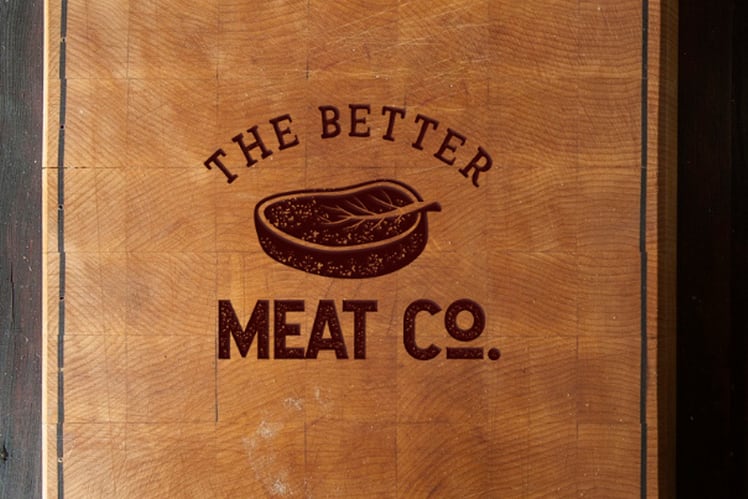But as you can imagine just by gauging your own reaction to the above terms, not all terms are created equal, and in the free market, there aren’t participation trophies for new products. Some terms will outcompete others and sell better.
In other words, if you think the world would be better if people switched to a diet less reliant on raising and slaughtering animals, what these foods are called matters a lot.
Brands don’t get a second chance to make a first impression, and for many in this space, it’s become somewhat of an orthodoxy that the V-words are considered about as dirty to meat-eating consumers as the F-word is to churchgoers on Sunday morning.
But a new study by the animal advocacy think tank Faunalytics raises some meaty questions about that orthodoxy, finding that 'vegan' actually outperformed 'plant-based' among average consumers. (Though both terms did quite poorly with men.) Before looking at this anomalous study’s findings, let’s first take a look at why the current orthodoxy against the V-words has prevailed among so many in the sustainable protein space.
Is the V-word very bad?
The Good Food Institute has strongly urged food companies to use 'plant-based' rather than 'vegan' on their packaging. Calling a food 'vegan” certainly is helpful for vegans, the nonprofit argues, but it could be that catering to the small percent of the population that’s already vegan is deterring a much larger percent of potential customers. In other words, if you want to be popular with the 1% of the population that’s vegan, use 'vegan,' but if you want to be more popular with the 99% that are not, don’t.
In the same way labeling a food 'halal' may convey that it’s intended for pious Muslims, labeling a product 'vegan' or 'vegetarian' can convey that the food is intended for vegans and vegetarians. This may be one reason that simply moving vegan dishes on menus out of a designated vegetarian section and into the general menu dramatically increases orders of it: meat-eaters don’t look there since they don’t think it’s intended for them.
And several studies have found that Americans, well, just aren’t that fond of 'vegan.' Newsweek headlined in 2018 regarding research on the topic, “Nothing Is Less Appealing than Vegan Food, Survey Finds.” The article reported on a study conducted by a market research agency that tested a number of food marketing claims. The results:

Perceptions of vegans and veganism aren’t exactly helping, either. In one painful study (full text here), the only so-called 'out-group' less popular than vegetarians and vegans is drug addicts. And herbivores motivated by animal rights reasons were viewed 'especially negatively.' Even vegans seem to have a less-than-rosy view of fellow vegans.
These are some of the reasons the World Resources Institute (WRI) explicitly includes 'vegan' and 'vegetarian' in its 'DON’T USE' category, warning that 'vegan' means “different from me.”

New study questions the orthodoxy
Che Green, a long-time animal advocate who’s now a principal at the boutique marketing firm Cultivate Insights, recently wrote about Faunalytics’ new research. Asserting that “the evidence against using ‘v-words’ is pretty weak,” Green, also the founder of Faunalytics, critiqued the WRI admonition against the V-words, saying their menu placement study is too narrow and context-specific to make such bold claims about terms.
In its head-to-head comparison, Faunalytics found 'vegan' to outperform 'plant-based.' That said, the outperformance wasn’t dramatic. In fact, Faunalytics author Jo Anderson concluded, “There’s no clear consensus among consumers about which label is better.”
Part of the confusion may simply be in demographics. Younger people are less likely to have a negative view of 'vegans' than older folks, and indeed, men and women are attracted to different terms. As mentioned above, Faunalytics found 'vegan' was perceived more poorly by men than women, and that men also perceived 'plant-based' more negatively than women did.
Anderson also drew a possible distinction between how the terms affect those who already buy alt-proteins and those who don’t. 'Vegan,' she cautioned, “may not be the best choice if you want to bring in new consumers (people who don’t currently consume animal product alternatives) or men—especially young men.”
Do men just want more Bro-tein?
Faunalytics found that men generally favored a term like 'direct protein' over 'plant-based' or 'vegan.' The intent behind the term is that the consumer is getting protein directly from plants rather than funneling plants through animals from whom we then get the protein. Of course, presumably few consumers would understand what 'direct protein' is intended to mean, though perhaps it doesn’t matter, and of course, that could also change with education.
Perhaps men favored 'direct protein' simply because it has the word 'protein,' the macronutrient that American men are regularly told to consume more often. 'Direct protein' performed better than 'vegan' or 'plant-based' in Faunalytics’ study, and is the only term they tested with 'protein' in it. One could reasonably theorize, then, that 'plant protein' may be likely to do better than those other terms as well.
In the end, indulgence reigns
Regardless of where one comes down on the V-word-vs.-P-word debate, everyone is in agreement that foods must be marketed as pleasurable and appetizing. WRI’s research clearly shows that using terms that describe how the food looks and tastes as well as where it came from boost sales. Unsurprisingly, for example, Low Fat Vegetarian Black Bean Soup has a very different ring than Cuban Black Bean Soup. I’ll let you guess which sold more.
The new Faunalytics study raises important questions about perceptions of the V-words and how marketers might want to use them when appealing to certain audiences. But to the wider general audience of conventional meat-eaters, it may take more evidence to prove it’s not more of a deterrent.
Were Anderson talking with a sustainable protein marketer, however, she has somewhat Solomonic advice: “Don't be afraid of putting a ‘vegan’ icon on the back of your box to make it easy for people to understand,” she told me.
“But don't just call it either a ‘vegan stir-fry’ or a ‘plant-based stir-fry’ on the front: call it a ‘Sweet Potato Noodle Stir Fry with Thai Peanut Lime Sauce.’"

Paul Shapiro is the CEO of The Better Meat Co. and author of Clean Meat: How Growing Meat Without Animals Will Revolutionize Dinner and the World




